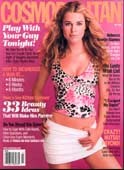
Do you think headlines promoting sex are too explicit for the checkout line? Do you think such messages are inappropriate for kids to see? Robert Peters, president of Morality in Media (MIM), certainly thinks so. Childrens Express interviewed Peters about his organization's mission to get supermarkets to limit the open display of Cosmopolitan magazine.
MIM is an interfaith, not-for-profit organization that aims to make sure obscenity laws are enforced at the federal and state level. Mostly the New York-based organization has focused on trying to limit the availability of hardcore pornography. Over the past year, MIM has sent letters to supermarket CEOs around the country, asking them to consider covering up Cosmopolitan covers with a blinder rack at the checkout counter or move the magazines somewhere else in the store so that kids and people who don't want to be exposed to the racy headlines aren't. Since MIM has historically focused on items they consider pornography, CE asked Peters if "pornographic" is how he would describe Cosmopolitan. "I think the broad definition would include some of the articles in Cosmopolitan. If you read them, they are most surely sexually explicit, and they are, in my opinion, intended to arouse. One of the keys of pornography is prurience, a purposeful appeal to lust. That's what pornography does."
 But MIM wasn't asking supermarkets to get rid of the Cosmopolitan articles, just to cover up the headlines. "I would describe them more as indecent, some crossing into the area of lewdness. But the headlines are advertising articles that are explicit enough and racy enough to fall within a broad definition of pornography," said Peters.
Peters explained they launched their campaign to get supermarkets to cover up the magazine because they received many letters complaining about Cosmopolitan's raunchy cover headlines advertising articles about sex. The organization itself is very small--it has a mailing list of
15,000 people and only a handful of people in a cluttered
office--but Peters said they receive many letters, on this
matter mostly from parents. Young people, they felt, should
not be exposed to Cosmopolitan covers.
"Parents are going through the checkout line, and they
really don't want their kids looking over and saying
'Mommy what does that mean?'" Peter said.
He said he did not receive any complaints from kids.
As Peters went on, we noticed most of the worries he cited
for how Cosmopolitan might negatively influence young
people focused on the inside content and not the cover.
He described the articles as "racy enough to fall within the
broad definition of pornography," and he thought they
might be bad for young women who think they have to
follow the magazine's sex advice to be popular. He went so
far as to say the magazine gives a social message that is
just as bad as Playboy's.
But MIM wasn't asking supermarkets to get rid of the Cosmopolitan articles, just to cover up the headlines. "I would describe them more as indecent, some crossing into the area of lewdness. But the headlines are advertising articles that are explicit enough and racy enough to fall within a broad definition of pornography," said Peters.
Peters explained they launched their campaign to get supermarkets to cover up the magazine because they received many letters complaining about Cosmopolitan's raunchy cover headlines advertising articles about sex. The organization itself is very small--it has a mailing list of
15,000 people and only a handful of people in a cluttered
office--but Peters said they receive many letters, on this
matter mostly from parents. Young people, they felt, should
not be exposed to Cosmopolitan covers.
"Parents are going through the checkout line, and they
really don't want their kids looking over and saying
'Mommy what does that mean?'" Peter said.
He said he did not receive any complaints from kids.
As Peters went on, we noticed most of the worries he cited
for how Cosmopolitan might negatively influence young
people focused on the inside content and not the cover.
He described the articles as "racy enough to fall within the
broad definition of pornography," and he thought they
might be bad for young women who think they have to
follow the magazine's sex advice to be popular. He went so
far as to say the magazine gives a social message that is
just as bad as Playboy's.
Viewing a cover of Cosmopolitan does not drastically affect the average youth. Kids are exposed to material that is as sexually provocative as that on a regular basis.

